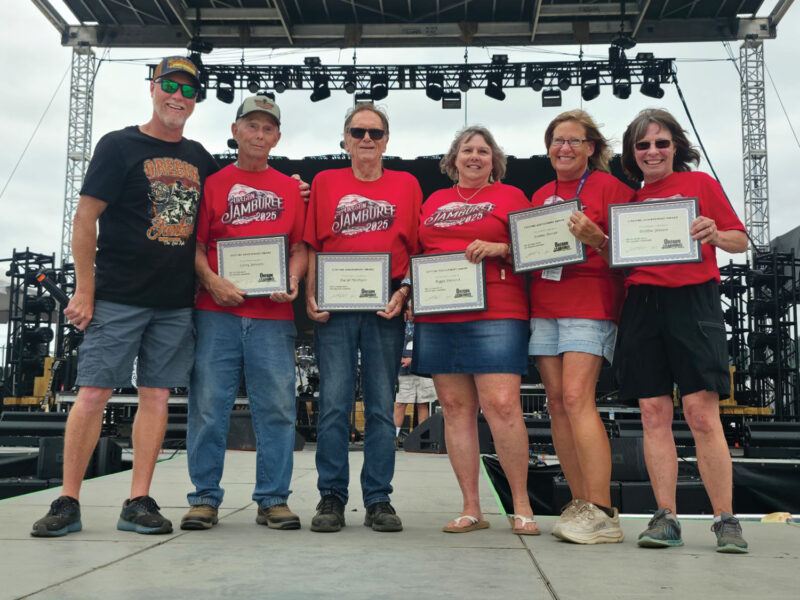Larry Johnson was athletic director at Sweet Home High School in 1992 when he got invited to a meeting.
Local residents Leslie Anke and Marge Geil had an idea. They had established a relationship with country music star Wynonna Judd, who had agreed to perform if they would put on a music festival in Sweet Home. They gathered about 25 people and took their shot. What did everybody think?
“Some people said ‘aahnt,’ some said ‘let’s go,’” Johnson said. “I was one of those who said ‘let’s go.’”
Johnson joined a steering committee headed by Geil and Anke, along with Police Chief Gary David, Dan Dean, Erland Erickson, Craig Fentiman, Kellie Good, Corky Lowen, Bill Hampton, Jann Horner, Doris Johnston, Bob Ratter and Dave Vassar.
That collaboration resulted in the first Oregon Jamboree.
Johnson soon was in charge of soft drink sales and this year, 34 years later, he was still overseeing that operation as he had for every Jamboree since the beginning.
He wasn’t the only volunteer who’d been there every year.
Working on accounting end was for nearly the entire run was Peggy Emmert.
Keeping an eye on crowd behavior, as she had since 1992, was Debbie Jensen.
Working with the stage crew was Daryl Nothiger.
And working backstage hospitality, making sure the artists and their teams had what they needed, was Donna Poirier.
All of them have been there, every year, since the beginning.
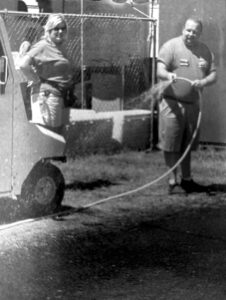
How did you get involved in the Jamboree?
Poirier: “To be honest, I didn’t think it would really happen.The chatter in the community was that Wynonna Judd was coming. ‘Sure, she is.’ Then it happened. I signed up to do security.”
She soon moved to backstage hospitality and that’s where she stayed.
“I worked my way through the ranks, doing anything and everything.
“Fortunately, I liked country music. There were a lot of people who don’t, but they just want to do something for the community.”
Emmert: “I had banking experience and they were looking for people to help with scrip. I was friends with Joan Reimer, who was working for First Interstate Bank. She was working in the cash trailer and I was working in scrip. I started helping out that year. Joan and I worked together for probably 25 years.
“When they stopped doing scrip and went to wristbands, I started helping Larry Johnson with vendor check-in five years ago.
“I don’t know, I just kept going.”
Jensen: “I had just moved to Sweet Home in 1991. My boyfriend (later my husband) worked for Sweet Home Sanitation. I volunteered the first year with the Clean Team and I liked it. The other reason I started was because I wanted tickets for my kids, Matt and Chris Jensen.
“So the second year I volunteered with street closure and the third year I came inside the fence.
“I remember thinking, ‘I hope it grows’ and it did. I was on the security team and crowd management after that. I never became a big supervisor because I liked dealing with people.”
Nothiger: “I was working for the School District at the time and they had a meeting of some kind and during that meeting the discussed the possibility of the Jamboree. They asked if anyone would volunteer and I thought, ‘That might be interesting.’
“I was kind of wondering what went on on stage before and after the performances, so I volunteered with the state crew.”
Johnson: “This was a way for kids to work and raise funds and give back to the community. I started figuring it out one time and all that stuff kids did that got money that came into their programs – food booths, ice cream, etc. – $1 million went directly into schools, directly into programs.”
What memories stick out for you from your years with the festival?
Emmert: Some of the interesting outfits over the years, it was like, ‘Whoa, are you really wearing this in public?’
“The accounting trailer, for the longest time, was backstage. People tried to jump the fence. Usually they were caught.”
Jensen: “I lose my keys a lot. Every single year I would lose my car keys. (My team members) told me they were going to put my keys on a bowling ball and put it on stage.
“My mom volunteered just to see Reba McIntyre. She did great.
“Every year was always a great year. We would get frustrated by little things, but we were just a huge family.
“One year it rained when the festival was still in September and we had to keep our uniforms showing, so my mom went downtown and bought all the clear wraps for rain that she could find and brought them to us.
“And then there was the year the streaker ran from the beer garden to the Main Stage. I think he made it all the way.”
Nothiger: It was kind like everything else, it kind of gets in your blood, you kind of look forward to it.
“You see people year after year who come from different backgrounds, but we all worked for a common goal. I enjoyed meeting people from all over the country.
“I can’t remember the gentleman’s name – I met him at the first Jamboree. He was there all the time; he brought big-screen TVs down from Canada.
“Larry (Johnson) was the ice man for 34 years. I guess that means the work wasn’t that difficult, to last 34 years.”
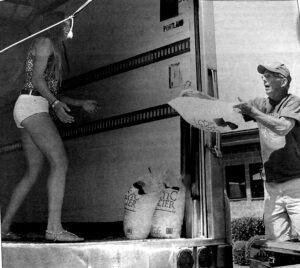
Johnson: “One night, after the program was completely over, , one lady was outside walking around, and she told us ‘I don’t know where I camped. Don’t tell anybody but I’m an engineer at Hewlett Packard.’”
“It was like a reunion every year,. I know so many of those vendors now. I only see them a few days very year. They are great people; a lot of them work awfully hard.
Poirier: “Tim McGraw brought the red Corvette. That was pretty memorable.
“In the early years, one of very first, that was when we only had 5-6,000 people, they thought the crowd was going to rush the stage and we formed a chain in front of the stage. It didn’t happen. We’ve learned a lot over the years.”
“Some of (the artists) have done kind things for people. I really like that. I remember one time Sugarland, when they were here, they prayed backstage for one of our volunteers’ nephew. Shortly after that, he passed away, but it was a touching little thing people don’t know about.
“Jordan Davis, he stood out on the T-thrust this year signing autographs until he was done.
“Those are the kind of people I enjoy. They fit in.”
Who was/were your favorite artist(s)?
Jensen: They’re all good memories, but Toby Keith was the best. Toby Keith will always stick out. I was a huge Toby Keith fan.
“My team found one of those big cardboard figures, and set it up in the corner and they said to me, “Hey Debbie, look, there’s Toby Keith over there. It was funny.”
Nothiger: “I enjoyed Toby Keith.”
Johnson: “I like all kind of music, but I only went backstage for Sarah Evans because she had ties to Jefferson.
“I remember Carrie Underwood; I was amazed at how small she was.
“One year I was out on the field and a guy comes walking across field, I don’t know who he is. He says, ‘Hello, I’m Hal Ketchum.’ I took my grandson home and told him, ‘Tell Grandma who we saw.’ So he says, ‘Grandma, we saw Hal Ketchup!’”
Poirier: “Keith Urban was my favorite, especially when he went out in the audience. He’s an amazing musician, an amazing singer who obviously loves what he does and that’s demonstrated in how he treats the people watching him. Neil McCoy is always fun.
“We couldn’t get George Strait. It would have been huge to have him.
“To be brutally honest, I was so busy I didn’t have time to pay attention to what’s on stage.”
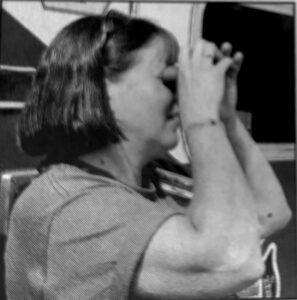
Emmert: “I loved them all. I liked Tim McGraw and Toby Keith a lot.
“Neil McCoy was hard to beat – he was so down-to-earth, like your neighbor next door.
“I always enjoyed Miranda Lambert show – a lot of that because of her connection with (Sweet Home native) Sarah Winslow (who worked as Lambert’s personal assistant). Knowing that she had that Sweet Home connection was kind of cool.
“It’s hard to think about all the acts we saw over 34 years.”
How did you see the Jamboree change over time – or did it?
Nothiger: The first few years, the stage was a lot smaller. It had a hand-cranked roof, which you had to lower every night and you had to do in unison or it wouldn’t go any further.
“Later, they came in with erector stages. The pieces had to be loaded on trucks and they wanted us to do it right after the show was over.
“ As the acts got bigger, singers started carrying more gear. Then had to pack up all the pro tours gear so they could haul it out the next morning.
“Then they put the small stage in, which I got to go to. It was a lot more relaxed atmosphere over there but the job was the same.”
Johnson: “When I first ran ice, everything was by hand. I lost a lot of weight moving ice over three days.
“Over the years, the campsites just blossomed. We used to have parking spots, we sold parking across street, next to swimming pool. Those became campgrounds.
“Safeway did whole lot for us that people don’t really know about.
“During the first few years, even after we took it over from the Nashville (management) people, we would talk to people who came up and a lot of them from out of state, they would say, ‘I just feel so safe here.”
“We were like, ‘What?’ Now, every day we’re all thinking of that. But in those first 15 years, a lof them were probably coming from larger towns. It didn’t cross our minds.”
Poirier: “I think we just tried to change it up every year so there was kind of element of surprise, something to make it better every year – photo ops or something interesting for people to do.
“People don’t understand all the mechanics, the logistics behind something this big. They just have no idea. I worked year-round. In the early days I worked nine 12-hour days, then worked into 18-hour days. People put a lot of time into this.”
Emmert: “I think back to all the acts we’ve seen. Amazing.The people who played on the Sankey Park stage are now big performers. The talent buyers did a good job of lining up good performers for us.”
Jensen: “Management was down by Mollie’s Bakery, then to Long Street. I was really sad to see it leave there. It was a huge part of our lives.
“We had some really great leaders. Peter LaPonte did a wonderful job. Erin (Regrudo) was amazing. Robert has been amazing.
“In the very beginning, I would take a picture of my team and I would hand-write messages on them, and send out cards with a big ‘thank you.’ That was the team that always came back to me every single year.
“I had people come all the way from Montana, Colorado, Utah and from all over Oregon. I had a really great team. Beth and Kelsey Matthews, Shari Thompson, Angie Morgan, so many.”
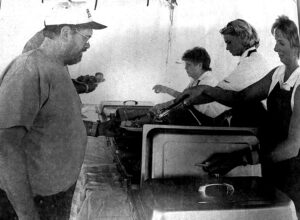
How do you feel about the decision to end the festival’s run?
Johnson: “I understand it. It was fulfilling for things I did, but if you look at the books, look at the massive changes – now you can go to this gambling arena, this stadium.
“Now, if you get somebody up the food chain, you can just give your kids away. It costs money.
“I can’t tell you the number of people not associated with us at all, who’ve said, ‘I sure wish this would keep going.’ It was so well done. They were glad they were there.They wished it would continue.”
Poirier: “It was sad. I always joked to everyone that I was going to be the last one standing.
“I’m really sad about it but it kind of is what it is. I’ve kind of done an internal grieving process.
“A lot of work goes into these. You don’t just show up. That’s what crushed me so much.
“But you’ve got a lot of people in town who are go-getters. They might step up and do something completely different. This community is very resourceful.
“We live in a beautiful area. People loved it for that reason. Very clean, very safe.
“And, now I have a lot more time, a lot more summer to hang out with my grandkids.”
Emmert: “It was fun and enjoyable. I just always loved it. It was something I looked forward to, where I could see friends I hadn’t seen for sometimes up to a year.
“Our kids just grew up going. It was part of our summer. Even when we moved out of town three years ago, I still wanted to do it.
“I thought it was something great for the community, something positive. It was nice to have something that people doubted would get off the ground and it developed into this.
“I remember thinking ‘would Tim McGraw really come?’ I knew Wynonna would because she’d promised. ‘Would this fizzle out or stick?’ It stuck.
Jensen: “Being in reserve seating, you see those people year after year after year. They become like family to you.
“I watched kids grow up. I watched kids inherit tickets. I saw grandkids get married. We all grew up together. It was really phenomenal. It’s been a great journey. I’m really sad to see it leave.”
Nothiger: “I was really shocked, along with other people, when they said that was it. Thought it was good for the town.
“Now I’ve got an empty weekend in August.”





